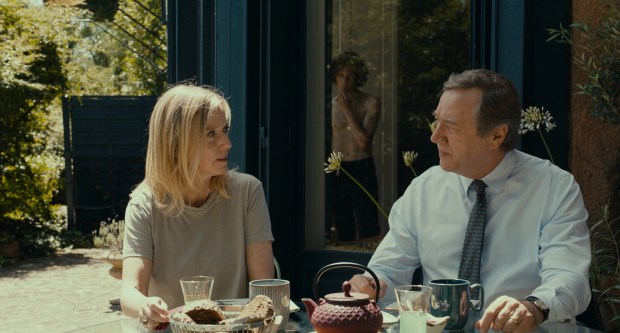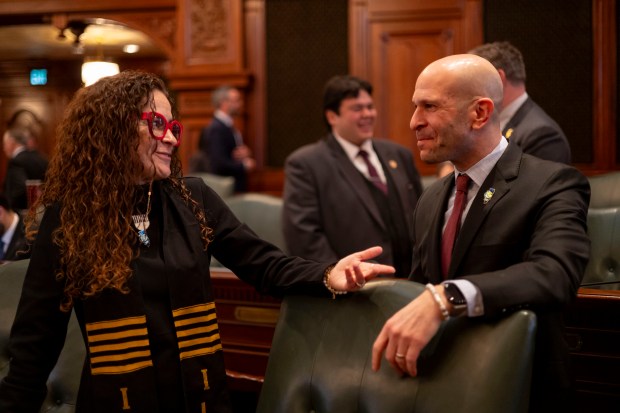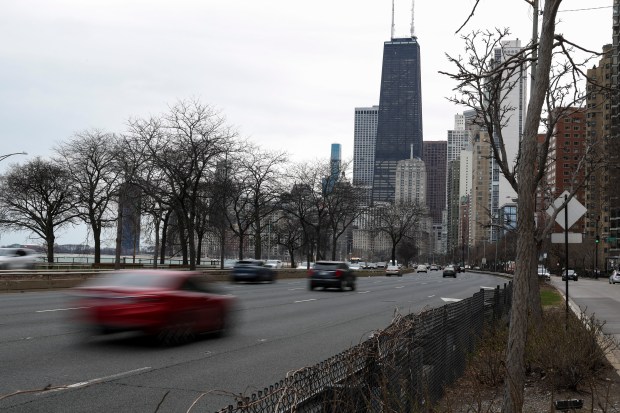Opening this week at the Gene Siskel Film Center, the suspenseful, elegantly destabilizing “Last Summer” concerns a defense attorney, her businessman husband, her husband’s teenaged son from an earlier marriage — and a particularly dangerous corner of sensual recklessness, price unknown.
It’s the first film in a decade from writer-director Catherine Breillat, of “Fat Girl” and “The Last Mistress,” among others. The opening minutes of “Last Summer” remind us of every sublime paradox found in the work of this filmmaker, now 75 and as much of a provocateur as ever. After a brief opening scene which turns out to be a bulletin from the story’s future, we meet Anne (Léa Drucker, a sphinx-like marvel), whose days are spent in court, often on behalf of sexual assault victims. With her husband Pierre (Olivier Rabourdin), steady but also steadily preoccupied with work, Anne is raising two vibrant, busy daughters. It’s a comfortable life, somewhere in a lovely corner of France, and it’s working well. Or well enough.
Then someone drops into that well, fatefully. Fresh off his latest behavioral transgression at school and a run-in with the law, Pierre’s 17-year-old son Théo (Samuel Kircher) agrees to relocate to France from Switzerland to live with Pierre, Anne and the girls. Father and son have a distant, wary relationship, and while Pierre describes him as “mean as hell,” when he’s introduced into the story he’s more of a determined, insolent lost soul all too used to being a jerk. When Anne gently chides the skinny boy with the Chalamet curls about his screen time (constant), his answer is succinct: “Back off. I’m busy.”
He’s also an adroit manipulator. While Pierre remains mired in guilt over not being around as a parent in the previous marriage, when Théo was younger, Anne finds ways to pry him out of his shell. In certain ways stepmother and stepson are both deceptive, or at least strategically truthful. When Théo starts conducting off-the-cuff tape recorded interviews of his young step-siblings (who he genuinely enjoys, as they do him), it’s only a matter of time before he points the cassette recorder more strategically in Anne’s direction, asking her about her first love and other minefields.
Then the affair begins. “Last Summer” is a work of artfully sustained sexual suspense, with “when will it start?” morphing into “how long can it remain secret?” and then something else. It’s an unnerving portrait in forbidden desire and matched wills, sometimes acting as one barely controlled organism, often at fierce odds.
I’ll leave the narrative there. Breillat and co-writer Pascal Bonitzer aren’t so much springing major twists as they are focusing on what the key characters are thinking and feeling, in variously intimate and often unpredictable contexts. Watching this film, which is not in any way flamboyant or punchy in its technique, you’re reminded of just how seldom American directors set up a shot for two actors to inhabit, easily, for many seconds or even minutes. This is why Drucker and Kircher are so effective: The uncomfortable discoveries their characters make, or try to unmake, feel as if they’re happening in real time between two people inhabiting the same seductive nightmare.
The movie’s confident and sure-footed enough to make its origins something of a surprise. “Last Summer” is a pretty faithful adaptation of the 2019 film “Queen of Hearts,” directed and co-written by Danish-Egyptian filmmaker May el-Toukhy. In that earlier picture (also good!) the stepmother’s the clear instigator, and a more combustible emotional creature. Breillat’s changes, I think, are entirely for the better. Her movie plays many guessing games, but it’s more emotionally complex, and subtler, than its source material. Now and then someone delivers a clunky thesis line, as when Anne, made both imperious and eerily girlish by Drucker, asserts the need to “keep a secret to maintain a pretense of family.”
Then again: Whatever the secret, whatever the reasons, how many millions of parents have made the same assertion?
“Last Summer” — 3.5 stars (out of 4)
No MPA rating (nudity, sexuality, language)
Running time: 1:44
How to watch: July 12-18 at Gene Siskel Film Center, 164 N. State St.; www.siskelfilmcenter.org. In French with English subtitles.
Michael Phillips is a Tribune critic.





